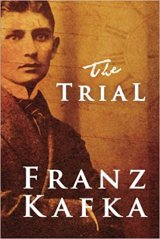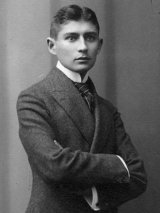The Trial Page #5
The Trial is a novel written by Franz Kafka between 1914 and 1915 and published posthumously on 26 April 1925. One of his best-known works, it tells the story of Josef K., a man arrested and prosecuted by a remote, inaccessible authority, with the nature of his crime revealed neither to him nor to the reader. Heavily influenced by Dostoevsky's Crime and Punishment and The Brothers Karamazov, Kafka even went so far as to call Dostoevsky a blood relative. Like Kafka's other novels, The Trial was never completed, although it does include a chapter which appears to bring the story to an intentionally abrupt ending.
That spring, whenever possible, K. usually spent his evenings after work - he usually stayed in the office until nine o'clock - with a short walk, either by himself or in the company of some of the bank officials, and then he would go into a pub where he would sit at the regulars' table with mostly older men until eleven. There were, however, also exceptions to this habit, times, for instance, when K. was invited by the bank's manager (whom he greatly respected for his industry and trustworthiness) to go with him for a ride in his car or to eat dinner with him at his large house. K. would also go, once a week, to see a girl called Elsa who worked as a waitress in a wine bar through the night until late in the morning. During the daytime she only received visitors while still in bed. That evening, though, - the day had passed quickly with a lot of hard work and many respectful and friendly birthday greetings - K. wanted to go straight home. Each time he had any small break from the day's work he considered, without knowing exactly what he had in mind, that Mrs. Grubach's flat seemed to have been put into great disarray by the events of that morning, and that it was up to him to put it back into order. Once order had been restored, every trace of those events would have been erased and everything would take its previous course once more. In particular, there was nothing to fear from the three bank officials, they had immersed themselves back into their paperwork and there was no alteration to be seen in them. K. had called each of them, separately or all together, into his office that day for no other reason than to observe them; he was always satisfied and had always been able to let them go again. At half past nine that evening, when he arrived back in front of the building where he lived, he met a young lad in the doorway who was standing there, his legs apart and smoking a pipe. "Who are you?" immediately asked K., bringing his face close to the lad's, as it was hard to see in the half light of the landing. "I'm the landlord's son, sir," answered the lad, taking the pipe from his mouth and stepping to one side. "The landlord's son?" asked K., and impatiently knocked on the ground with his stick. "Did you want anything, sir? Would you like me to fetch my father?" "No, no," said K., there was something forgiving in his voice, as if the boy had harmed him in some way and he was excusing him. "It's alright," he said then, and went on, but before going up the stairs he turned round once more.
Translation
Translate and read this book in other languages:
Select another language:
- - Select -
- 简体中文 (Chinese - Simplified)
- 繁體中文 (Chinese - Traditional)
- Español (Spanish)
- Esperanto (Esperanto)
- 日本語 (Japanese)
- Português (Portuguese)
- Deutsch (German)
- العربية (Arabic)
- Français (French)
- Русский (Russian)
- ಕನ್ನಡ (Kannada)
- 한국어 (Korean)
- עברית (Hebrew)
- Gaeilge (Irish)
- Українська (Ukrainian)
- اردو (Urdu)
- Magyar (Hungarian)
- मानक हिन्दी (Hindi)
- Indonesia (Indonesian)
- Italiano (Italian)
- தமிழ் (Tamil)
- Türkçe (Turkish)
- తెలుగు (Telugu)
- ภาษาไทย (Thai)
- Tiếng Việt (Vietnamese)
- Čeština (Czech)
- Polski (Polish)
- Bahasa Indonesia (Indonesian)
- Românește (Romanian)
- Nederlands (Dutch)
- Ελληνικά (Greek)
- Latinum (Latin)
- Svenska (Swedish)
- Dansk (Danish)
- Suomi (Finnish)
- فارسی (Persian)
- ייִדיש (Yiddish)
- հայերեն (Armenian)
- Norsk (Norwegian)
- English (English)
Citation
Use the citation below to add this book to your bibliography:
Style:MLAChicagoAPA
"The Trial Books." Literature.com. STANDS4 LLC, 2025. Web. 23 Feb. 2025. <https://www.literature.com/book/the_trial_1052>.








Discuss this The Trial book with the community:
Report Comment
We're doing our best to make sure our content is useful, accurate and safe.
If by any chance you spot an inappropriate comment while navigating through our website please use this form to let us know, and we'll take care of it shortly.
Attachment
You need to be logged in to favorite.
Log In